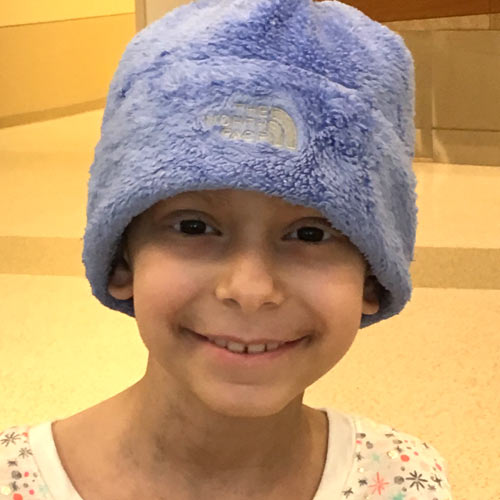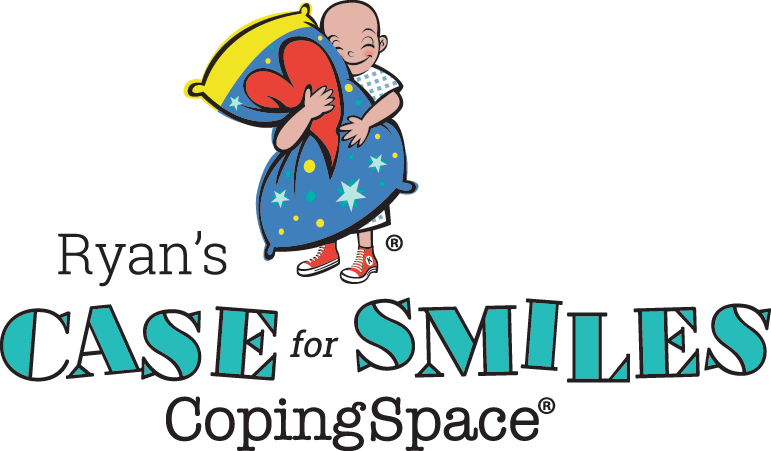SCHOOL AGE CHILDREN
School-age children are developing a basic understanding of their body, how it works, and how medicines and treatments might help. They have started to develop coping skills for upsetting situations, and probably have some ways to help themselves feel better or calm down when they are a little bit scared.
School-age children are developing a basic understanding of their body, how it works, and how medicines and treatments might help. They have started to develop coping skills for upsetting situations, and probably have some ways to help themselves feel better or calm down when they are a little bit scared.
 A serious illness or having to be in the hospital is a new challenge, and your school age child needs your help to understand and cope. At this age, children watch closely and take cues from you and other adult’s non-verbal behaviors regarding how serious the illness is, and how they should react. They may not believe verbal explanations if what they see does not match up to what you and others are telling them. In addition, they:
A serious illness or having to be in the hospital is a new challenge, and your school age child needs your help to understand and cope. At this age, children watch closely and take cues from you and other adult’s non-verbal behaviors regarding how serious the illness is, and how they should react. They may not believe verbal explanations if what they see does not match up to what you and others are telling them. In addition, they:
- Will use their imagination to “fill in the blanks” when they do not have realistic information
- May believe their illness or injury is punishment for something they did wrong
- Can experience significant grief and loss reactions, even if the loss was expected and discussed
- Often react out of frustration and helplessness – try to keep this in mind if your child seems to lash out in irritation or anger
- Need routines, predictability, and behavioral limits to re-establish feelings of safety and security
- May be affected by what they sense from caregivers and others
 A serious illness or having to be in the hospital is a new challenge, and your school age child needs your help to understand and cope. At this age, children watch closely and take cues from you and other adult’s non-verbal behaviors regarding how serious the illness is, and how they should react. They may not believe verbal explanations if what they see does not match up to what you and others are telling them. In addition, they:
A serious illness or having to be in the hospital is a new challenge, and your school age child needs your help to understand and cope. At this age, children watch closely and take cues from you and other adult’s non-verbal behaviors regarding how serious the illness is, and how they should react. They may not believe verbal explanations if what they see does not match up to what you and others are telling them. In addition, they:
- Will use their imagination to “fill in the blanks” when they do not have realistic information
- May believe their illness or injury is punishment for something they did wrong
- Can experience significant grief and loss reactions, even if the loss was expected and discussed
- Often react out of frustration and helplessness – try to keep this in mind if your child seems to lash out in irritation or anger
- Need routines, predictability, and behavioral limits to re-establish feelings of safety and security

Signs Your School Age Child May Not Be Coping Well
Below are a few signs your child may be having trouble coping. If these go on for more than a few weeks, or interfere with your child’s everyday life, you may want to seek additional help from their doctor.
Watch to see if your child:
- Wants to be alone or to be with you all the time
- Becomes easily overwhelmed, jumpy or irritable
- Changes their behavior, becoming more sensitive, quiet, or talking back and getting in to fights
- Has trouble sleeping or has nightmares
- Misses friends or feels left out
- Develops problems in school
Ways to Help School Age Children
-
To best help your child(ren), look at the big picture and consider:
- What are things that you need as a caregiver?
- What information do the children need to be made aware of?
- What resources are available along the way to help?
- Ask your child what they know about the illness or injury. This will give you a place to start. Also ask what they know about the hospital or clinic. If you’re nervous about having these difficult conversations, read How to Share Bad News with Your Child for additional support.
- When providing information, make sure you are open and honest, and encourage your child to ask questions not only of you, but also the healthcare staff.
- Be sure to talk about things other than their illness or treatment.
- Your school age child may overhear a lot of conversations and jump to conclusions based on having only part of the information. Talk to them about what they know and clear up any misconceptions.
- Your child will do best when they are prepared for whatever they will encounter. Children learn using their 5 senses, so prepare them by explaining what they may hear, see, feel, smell and taste. Try having them feel the medical equipment that will be used to try to help them to get better. Can they touch the IV tubing, blood pressure cuff or the pulsox probe?
- Encourage your children to share their feelings. Talk about the many ways to share feelings (talking, drawing, story-telling, hugging) at different times (dinnertime, bedtime) and places (in the car, at home, in the hospital). There are some good books or activities to try in our Resources section.
- Help your child name their feelings such as being sad, scared, angry, jealous, or guilty. Share your own feelings and be a good listener, even if what they have to say is hard to hear.
- Create a plan with your child’s school to help them stay on track. Some hospitals have teachers on staff who may be able to assist with tutoring or communicating your child’s needs to the school.
Useful Phrases to Use With Your School Age Child
You know your child best, and probably have experiences which you can draw on now in talking with them about things that are hard or challenging. The child life specialist, doctors and nurses may also have specific suggestions for how to explain the illness or treatment in terms that work for your school-age child. Here are some additional suggestions to get you started. General:
General:
- “How are you doing? Is there anything that you are worried or scared about? When I am worried I think it is helpful to talk to someone.”
- “If you don’t want to talk right now, how about drawing or writing about what’s happening or how you’re feeling?”
- “Before the illness/injury life was a little different. Let’s talk about how things have changed, and what that means for (the week, month, year, lifetime).”
- “It may make you sad that things have changed and that you can no longer ________. Let’s make a list of things that you would like to do and see if there is a way to do them.”
Hospital/Clinic:
- “The hospital/clinic is a new place for all of us. If there is something that you are not sure about, or that worries or scares you, please let me (us) know so we can talk about it.”
- “The hospital/clinic is a new place for all of us. There are some things that the doctors and nurses will need to do so they can help your body. You can help too!”
- “There are a lot of people who work in the hospital/clinic. They are there to help. If there is something that you do not know, ask them. It’s part of their job to answer your questions!”
- “The hospital/clinic can be scary because there are new people and it is a new place. All of the people who work in the hospital/clinic are there to help. They take care of a lot of kids each day.”
- Talk to your child about what their job is in the hospital. “Your job is to put the thermometer under your tongue so the nurse can get your temperature.”
- “Sometimes to best help your body, the nurses or doctors have to check it out or give you medicines that can only be given at the hospital/clinic.”
- “Some medicines have to be given by using a needle. It may feel like a pinch. Your job is to hold still, and I can help you think about something else while it happens. You can choose to (hold my hand, look at a book) while nurse/doctor does their job.”
- Note: Find out from the child life specialists, nurses and doctors what to expect, and choose your words accordingly. It is important not to make promises (e.g. it will only be a small pinch) that are not realistic.
Preparing Your Child for the Hospital or Procedures
Distraction is often the best way you can help a child during an injection or other procedure. Help them look at, think about, and get involved in something else. You might have your child blow bubbles, blow to spin a pinwheel, look at a game on your phone – anything that engages their attention. It may seem odd, but saying reassuring things to your child, like “It will only hurt a little”, “You are so brave with this pain”, or “I am so sorry this is hurting you”, has actually been shown to increase pain or distress during a procedure. So focus on distraction, and praise your child for SPECIFIC things they are doing. (“Great job holding still and focusing on the game!”)
It may seem odd, but saying reassuring things to your child, like “It will only hurt a little”, “You are so brave with this pain”, or “I am so sorry this is hurting you”, has actually been shown to increase pain or distress during a procedure. So focus on distraction, and praise your child for SPECIFIC things they are doing. (“Great job holding still and focusing on the game!”)
Helpful Phrases
- “You will have to stay overnight in the hospital so that you can get the medicines your body needs. These are medicines that mom/dad cannot give you at home.”
- “Sometimes kids have to go to the hospital to get the medicine that their body needs. You are going to go to the hospital but we are not planning on staying overnight. Instead, we will go to the doctor’s office at the hospital, it’s called the clinic. At the clinic you will be cared for by nurses and doctors who will check you out and give you the medicines that you need.”
- “In the hospital there are a lot of machines that the hospital workers use to try to help a person’s body. Sometimes they can sound, smell or look different. If we see something that we do not know about, let’s ask so it is not so scary.”
- Types of Hospitals
• Children’s Hospital: “We need to go to the hospital so you can get your medicines. This hospital is just for kids.”
• Pediatric Floor in an Adult/Community Hospital: “We need to go to the hospital so you can get your medicines. This hospital has an area where kids, like you, are helped.”
• Community Hospital Without a Pediatric Floor: “We need to go to the hospital so you can get your medicine. This hospital cares for grown-ups and kids. The doctors and nurses know how to help kids, like you.”
- “In the hospital there are a lot of machines that the hospital workers use to try to help a person’s body. Sometimes they can sound, smell or look different. If we see something that we do not know about, let’s ask so it’s not so scary.”
- Think of the 5 senses – smell, taste, hear, see and touch – when you prepare your child for a procedure. For example, you may hear the beeping of the machine on an IV pole.
- Let your child know that it is okay to be scared, mad or upset. Tell them that the doctors and nurses are trying to help their bodies. “I know this is scary for you. You can hold my hand and we can sing a song.” “The doctors and nurses are here to try to help your body.”
- Try to avoid the word “take” as young children may think that something is leaving them. Example: “The nurse is going to take your temperature.” Try saying, “The nurse is going to check your temperature.”
- Be careful of the word “just” as your child may feel that their feelings are not validated. In some cases your child may be showing a reaction to what they think is going to happen or how something may feel. At other times the fear of pain may be real to them.
- Try to avoid the word “okay” after a sentence. This could imply that your child has a choice, when they may not. For example: “We need to go to the hospital to get your medicine, okay?”
Tips for Talking with School Age Children
- When talking with your child, get down at their eye level. It will help make them feel comfortable.
- Be open and honest, using words they can understand. Call the illness by its name (cancer, diabetes, etc.).
- Ask your child what they know about the illness or injury. This will help you learn what they are thinking (you might be surprised by what they understand, or misunderstand), and will give you a place to start. Also ask them what they know about the hospital or clinic.
- Remember that your child will not be able to handle a lot of information at once. You may want to break it down to a few mini conversations, addressing only the things that are relevant at the time.
- Reassure them that they did not get sick because of anything that they said or did. (If the illness or injury was due in part to something that was done, omit this statement, or emphasize what they are doing now to help themselves get better.)
- Encourage your children to share their feelings. There are many ways to share feelings (talking, drawing, storytelling, hugging) at different times (dinnertime, bedtime) and places (in the car, at home, in the hospital). There are some good books or activities to try in our Resources section. For example, Play Doh is good for helping to work out angry feelings.
- Help you child name their feelings, such as being sad, scared, angry, jealous, or guilty, and let them know it’s okay. Encourage them to talk to you when they feel upset and be a good listener even if what they have to say is hard to hear.
- Share your own feelings and things that help you cope.
- End each talk by asking your child if they have any questions. Encourage them to ask questions, not only of you but also the healthcare staff.
- For more tips on having difficult conversations, read How to Share Bad News with Your Child.
